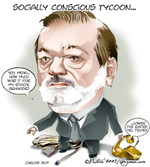The U.S. has lost its place as the leading technology nation.
That’s the news from an annual survey of technology policy known as the World Economic Forum’s "networked readiness index," which previously had the U.S. on top.
Now we’re 7th. Denmark, Sweden, Singapore, Finland, Switzerland and the Netherlands all scored ahead of the U.S. in the annual survey.
Ironically these countries, and others, have spent the decade copying the tech policies the U.S. had in the 1990s. They have broken up telecomm monopolies, pushed competition for all forms of bit traffic, and encouraged rapid write-offs of all investments.
The committee producing the report was headed by Chilean economist Augusto Lopez-Claros (left, above). This is ironic because throughout the 1990s Republicans held up Chile’s forced privatization under Pinochet as a model for Latin American development. In this decade, Chile’s performance has not been as good.
By contrast to the policies being pursued in nations that are improving their telecommunications infrastructure, the U.S. has been encouraging monopoly, "consolidating"
into a system akin to that of Mexico, which is owned by one man, Carlos
Slim. Mexico, by the way, ranks 58th but Slim is now the world’s third-richest man, behind only Bill Gates and Warren Buffett. Gates and Buffett, however, got rich by competing. Slim, on the other hand, gets fat while the hope of his people grows slimmer. He’s the model for "Bush economics."
That’s what happens when you have an Orwellian telecomm policy. Less
competition means you’re less competitive. Higher prices mean
businesses go elsewhere. All this can be reversed, although that
becomes more difficult to do every year. But it must be reversed if the
U.S. is to remain a major economic power.












